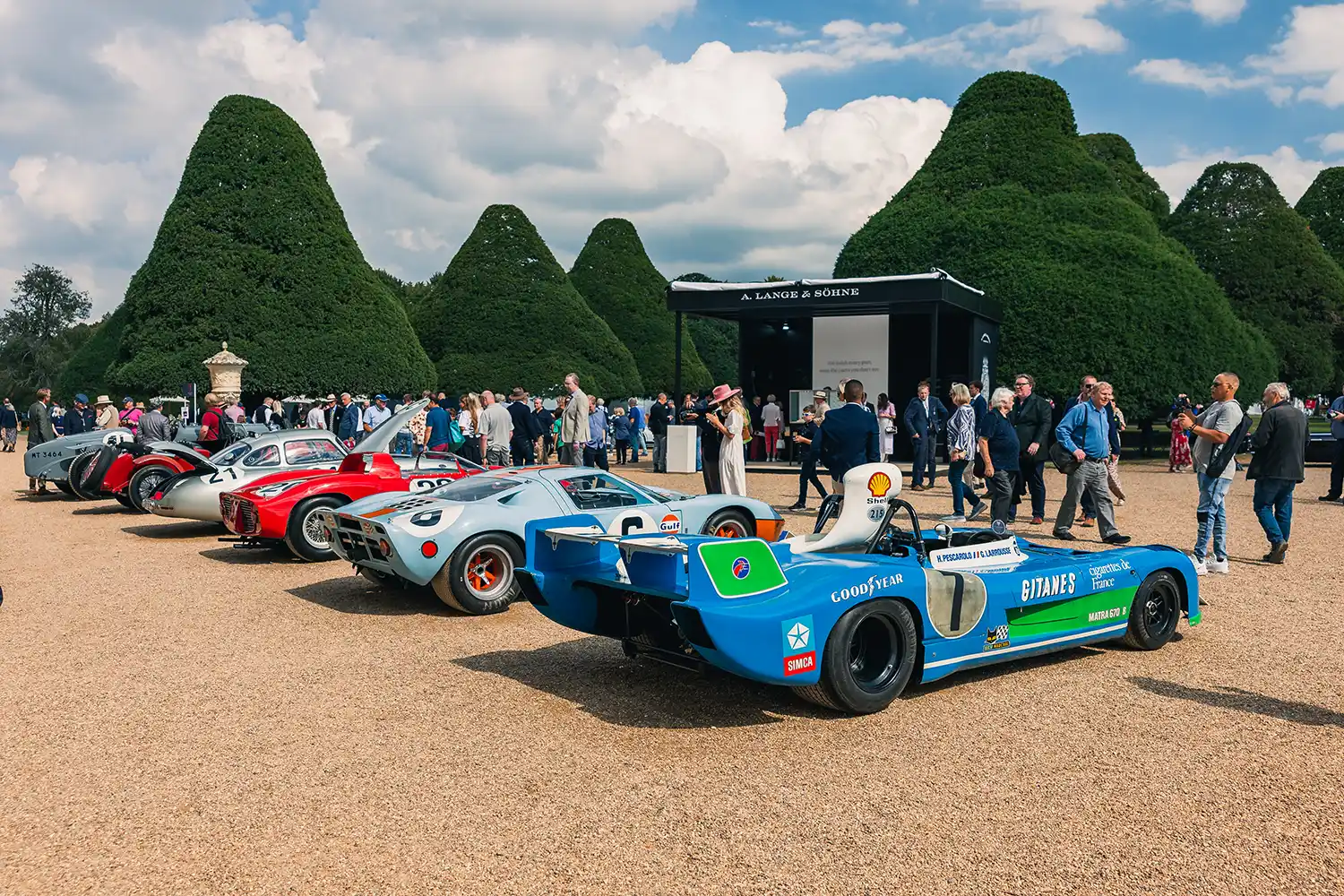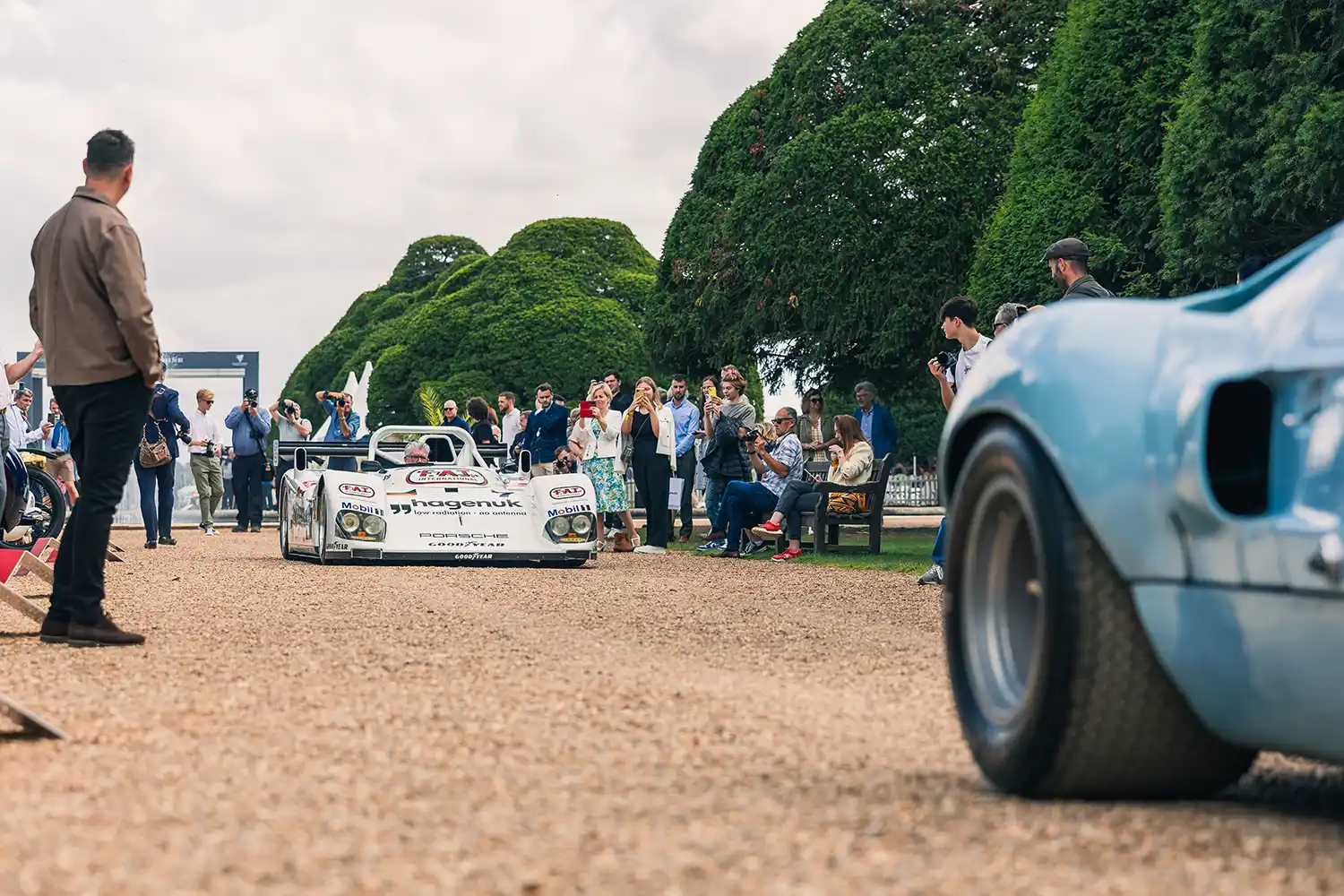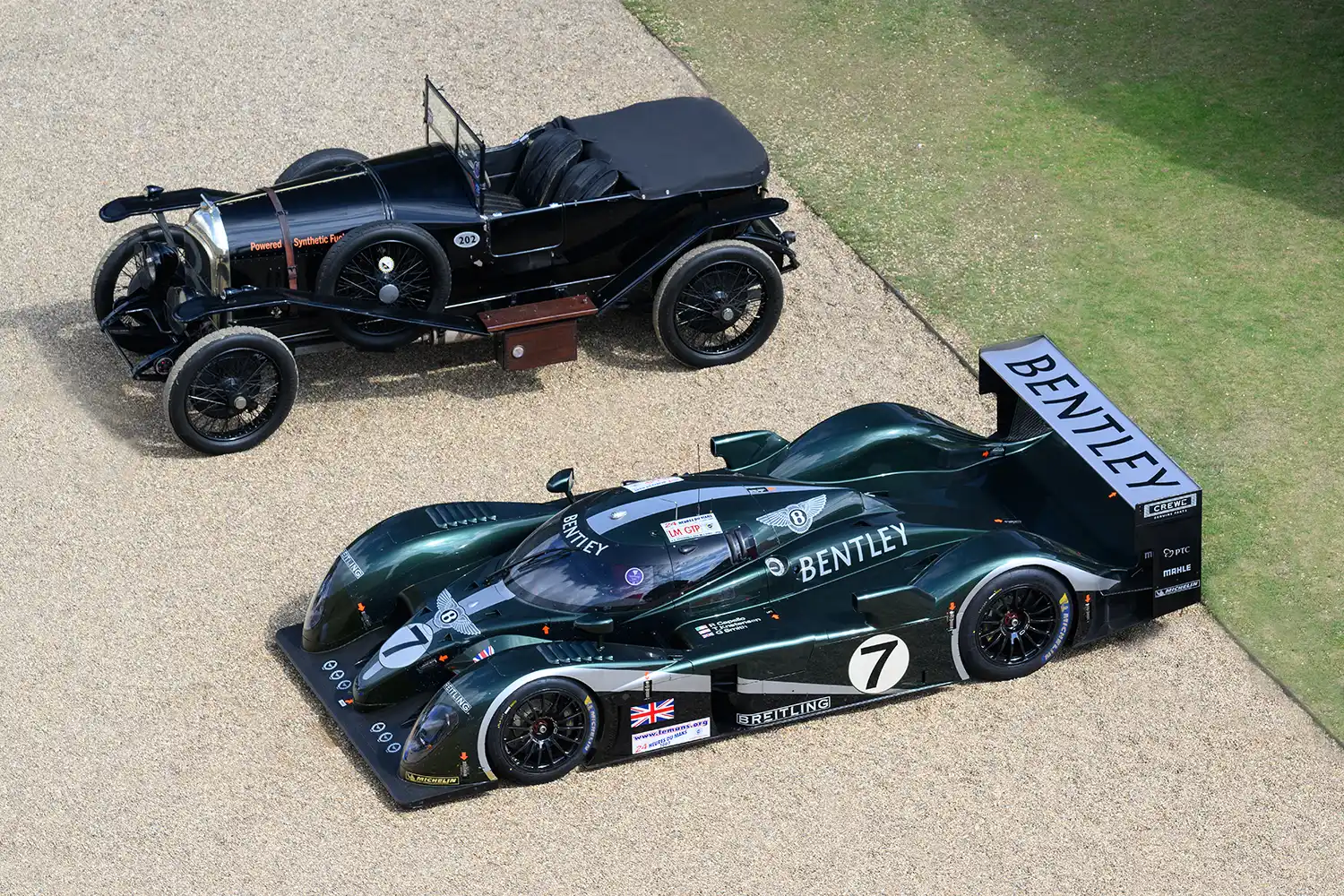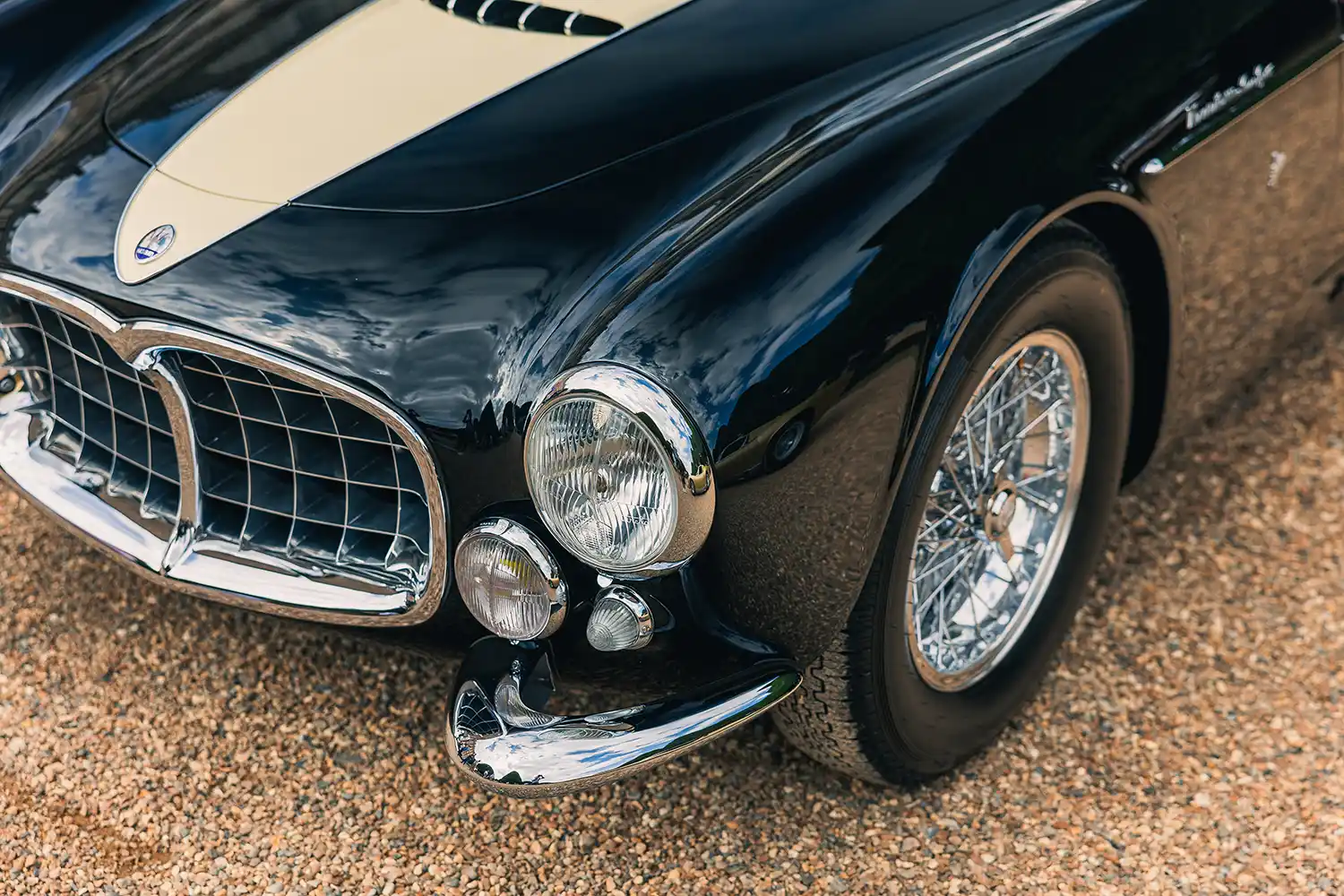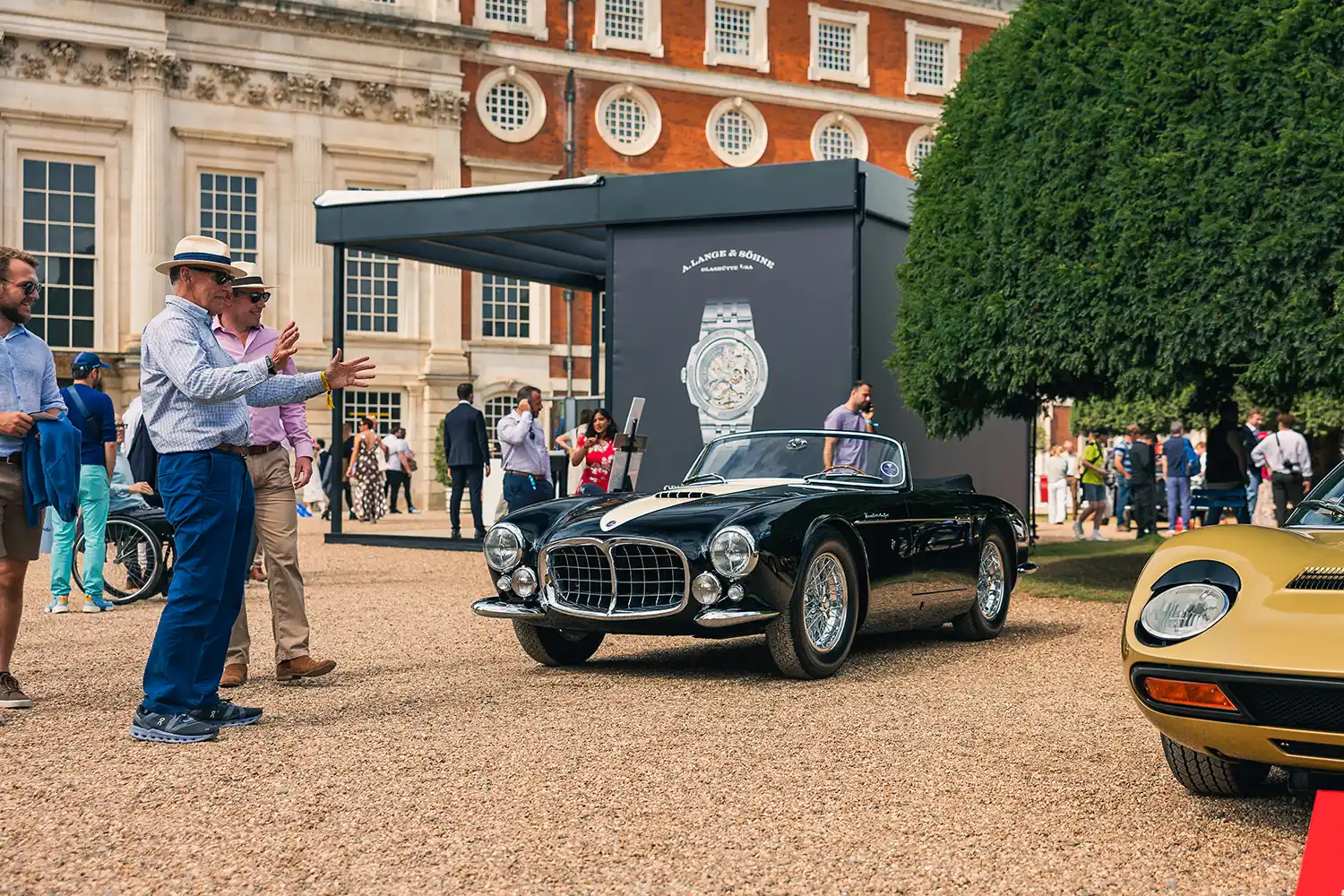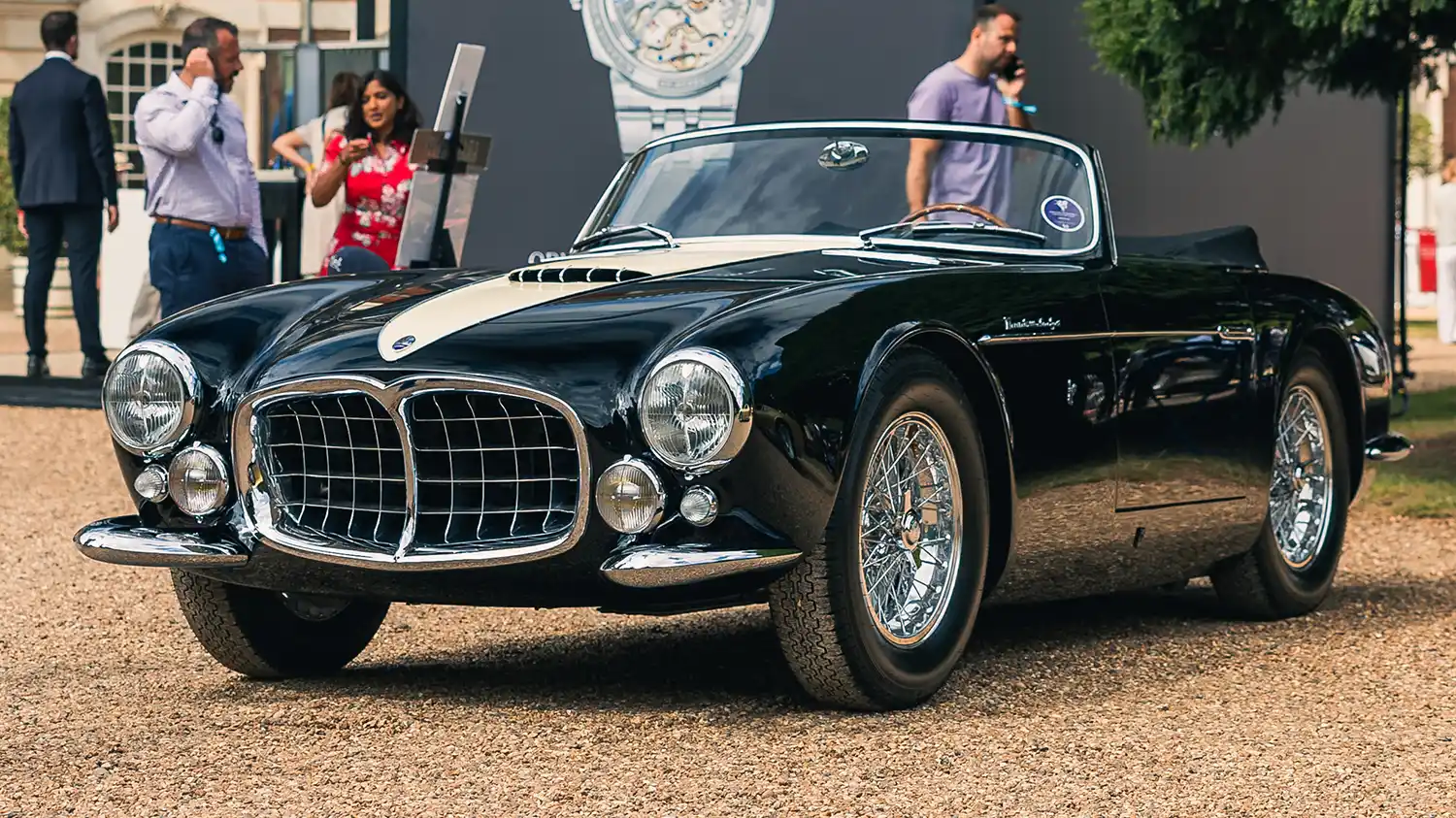
The Concours of Elegance, presented by A. Lange & Söhne, concluded yesterday after yet another fabulous automotive extravaganza, held over three days at Hampton Court Palace in west London. The 12th edition of the annual event welcomed 15,000 visitors to the stunning Palace gardens, for a landmark display of rare and significant road and competition machinery. The Best in Show winner – uniquely chosen by the Concours car owners themselves – was the irresistible 1955 Maserati A6GCS/53 Frua Spider – a masterpiece of Italian design, making its debut appearance on British soil.
The Le Mans centenary celebration was another stunning highlight. The display, in partnership with L’Automobile Club de L’Ouest, assembled a jaw-dropping array of significant La Sarthe legends, including 10 winners and 4 double winners – a line-up the likes of which has never before been seen in the UK. Elsewhere, Fritz Burkard was celebrated as The Collector for 2023, with a diverse range of machinery from his ‘Pearl Collection’ delighting crowds.
The triumphant 2023 edition further affirms the Concours of Elegance’s position as the UK’s top Concours d’Elegance event, and one of the top three globally.
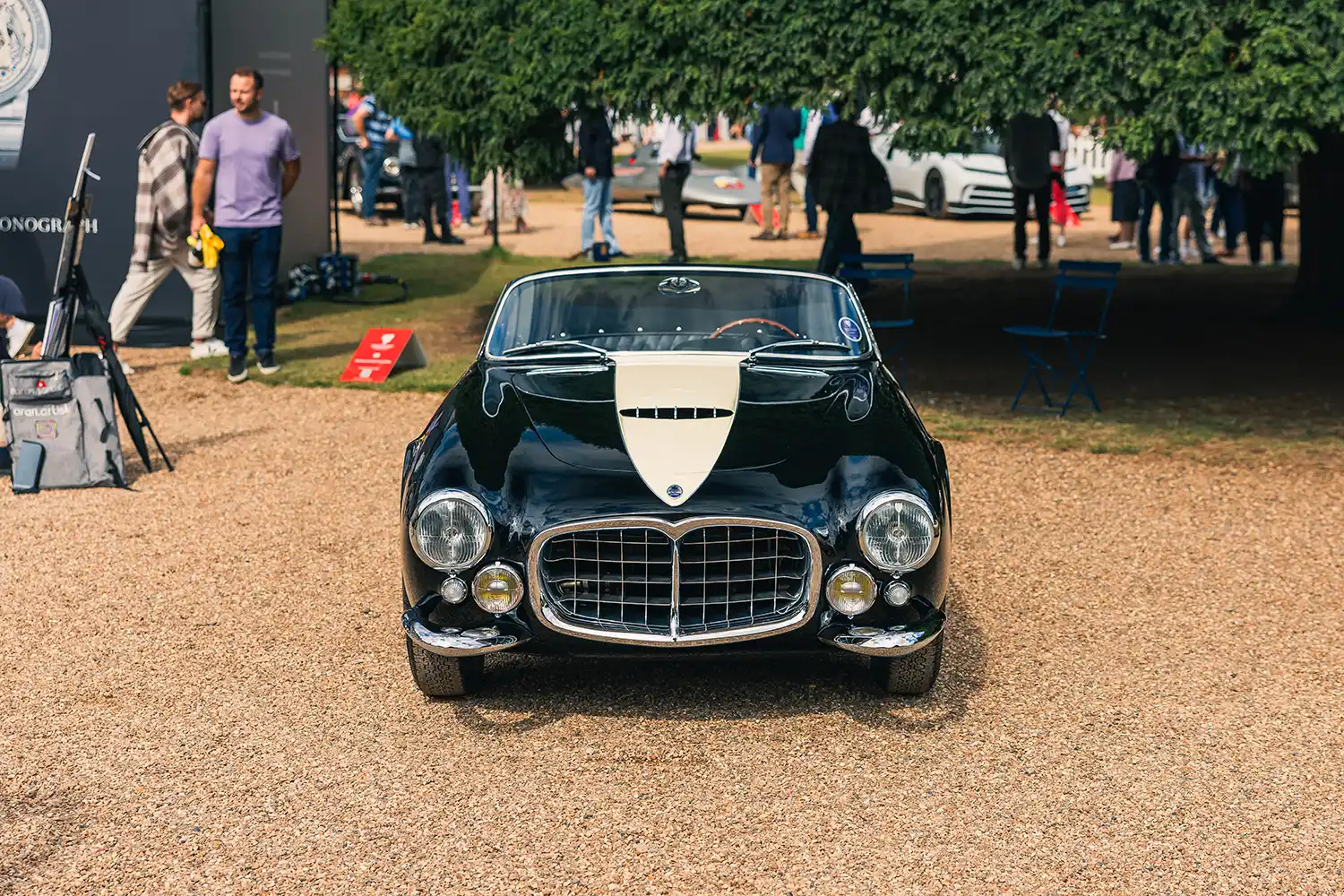
Best In Show: 1955 Maserati A6GCS/53 Frua Spider
Our best in show winner for 2023: an exceptionally rare vehicle, one of just three completed with delightful Frua coachwork, and two that survive. The Frua Spider is widely considered to be among the most beautiful and desirable 1950s cars of all.
The wonderful A6GCS Frua Spider was conceived by Gugliemo ‘Mimmo’ Dei, the official Maserati dealer for Rome, who commissioned a small series of exquisitely coachbuilt cars based on the high-performance A6GCS platform. The A6GCS/53 – the ‘CS’ standing for ‘Corsa Sport’ – had originally been developed for the 1953 World Sports Car Championship, and featured motorsport-honed mechanicals. It featured a potent 170bhp in-line six-cylinder engine – initially developed by famed engine builder Columbo for Formula 2 racing – and a similarly race-bred, lightweight tubular chassis by Gilco. The resulting car, weighing just 740kg, was a real work of automotive art, the perfect blend of delicate spider styling, delightful handling, and potent, race-car performance.
Chassis 2110 was shipped to the United States in the late 1950s where it has remained until the present day. In the early 2000s it was subject to a painstaking restoration under the supervision of Maserati aficionado Adolfo Orsi. It’s appearance at Hampton Court represented its first ever UK appearance. A wonderful motor car and a fitting winner.
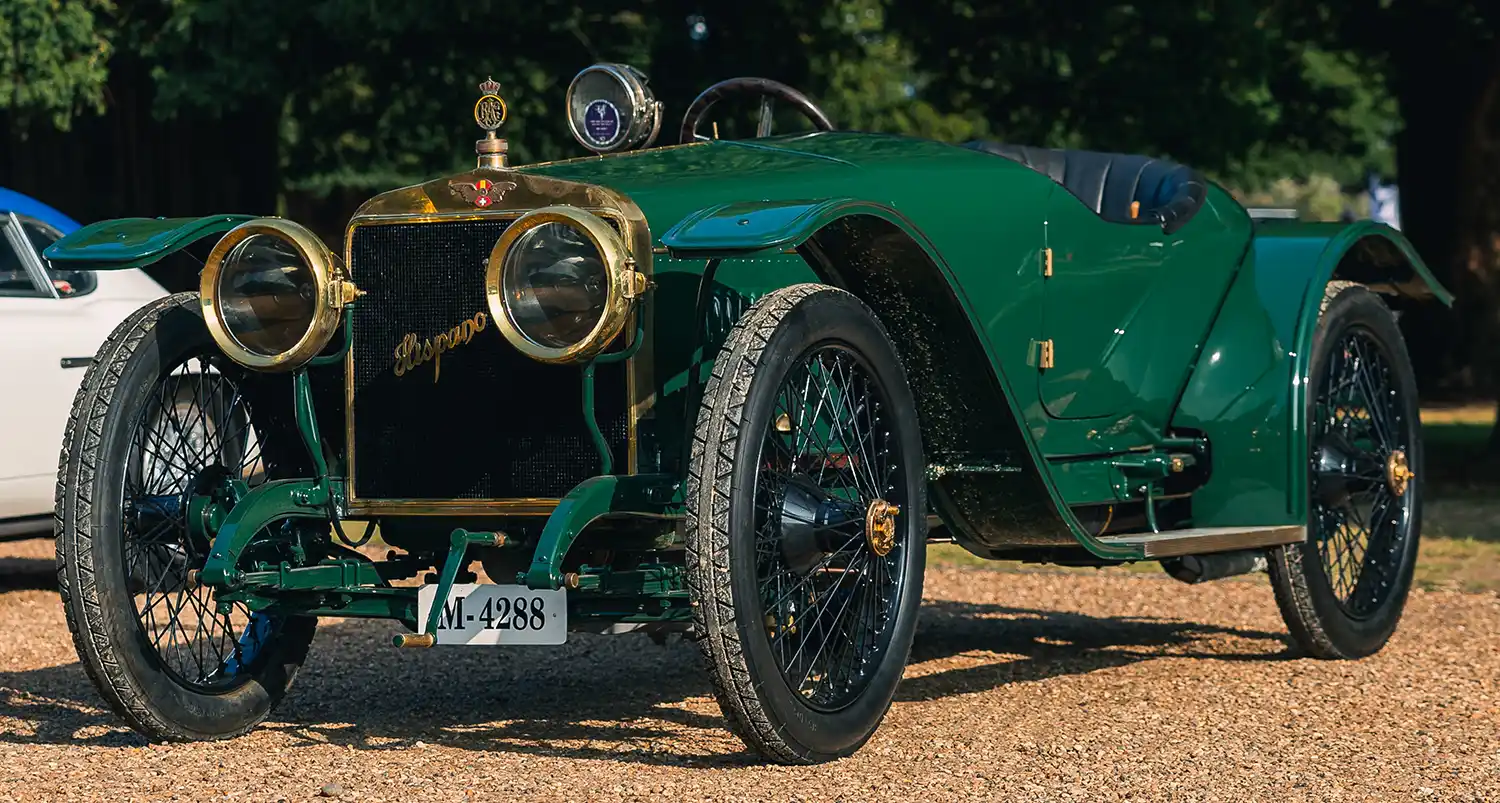
Pre-1920: Hispano-Suiza 14/45HP ‘Alfonso XIII’
Elsewhere, there were class awards given for different eras – again voted for by the owners of the cars themselves. In the pre-1920 category, it was the 1913 Hispano-Suiza which came out on top. This roadgoing car’s aluminium body – unusually rakish for the period – was inspired by the Barcelona based marque’s successful race cars of the 1910s. Despite its modest dimensions, its slim bonnet conceals a large 3.6-litre four cylinder motor housed in the middle of the chassis, putting out 63bhp – enough for a top speed of 80mph. The 14/45HP was named in honour of the Spanish king, Alfonso XIII, and just 500 were built before the onset of World War One.
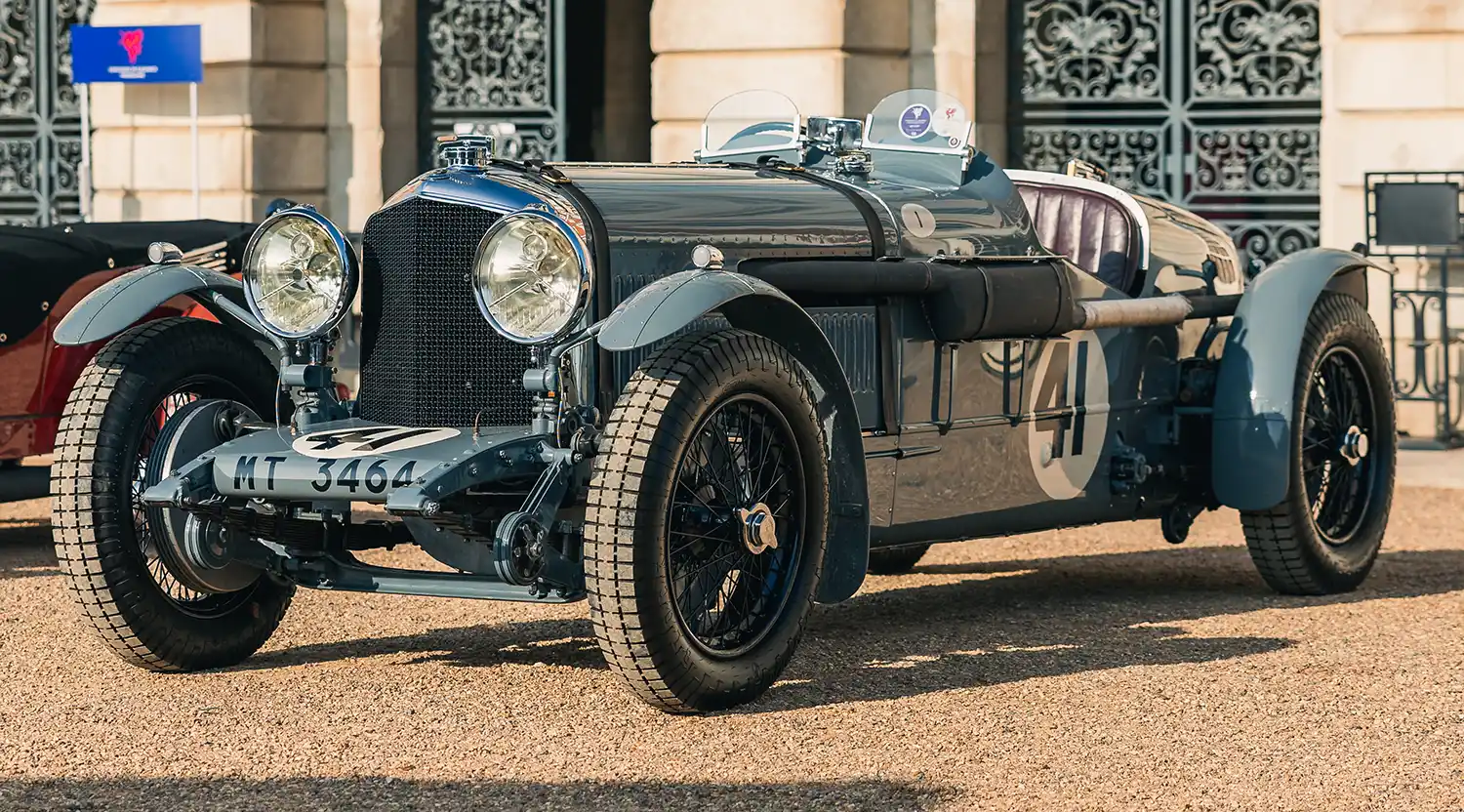
1920s: 1929 Bentley Speed Six ‘Old Number One’
In the 1920s category, it was the double Le Mans winning Bentley that came out on top. As the first car to win the 24 Hours back-to-back – in 1929 and 1930 – the Speed Six ‘Old Number One’ is considered to be among the greatest of Le Mans cars of all. It was the lead machine of five entered by the British marque in ’29, and was based on the Speed Six sporting version of the venerable 6½ Litre tourer. Its tweaked engine made 190bhp, enabling 115mph flat-out. Piloted by Woolf Barnato and Tim Birkin, it led the team to a podium sweep – and in 1930, despite strong opposition from the newly entered Alfa Romeo and Mercedes-Benz, it repeated its winning feat, with Barnato and Glen Kidston at the wheel. A worthy winner, and arguably the most significant car in the grand history of British motor sport.
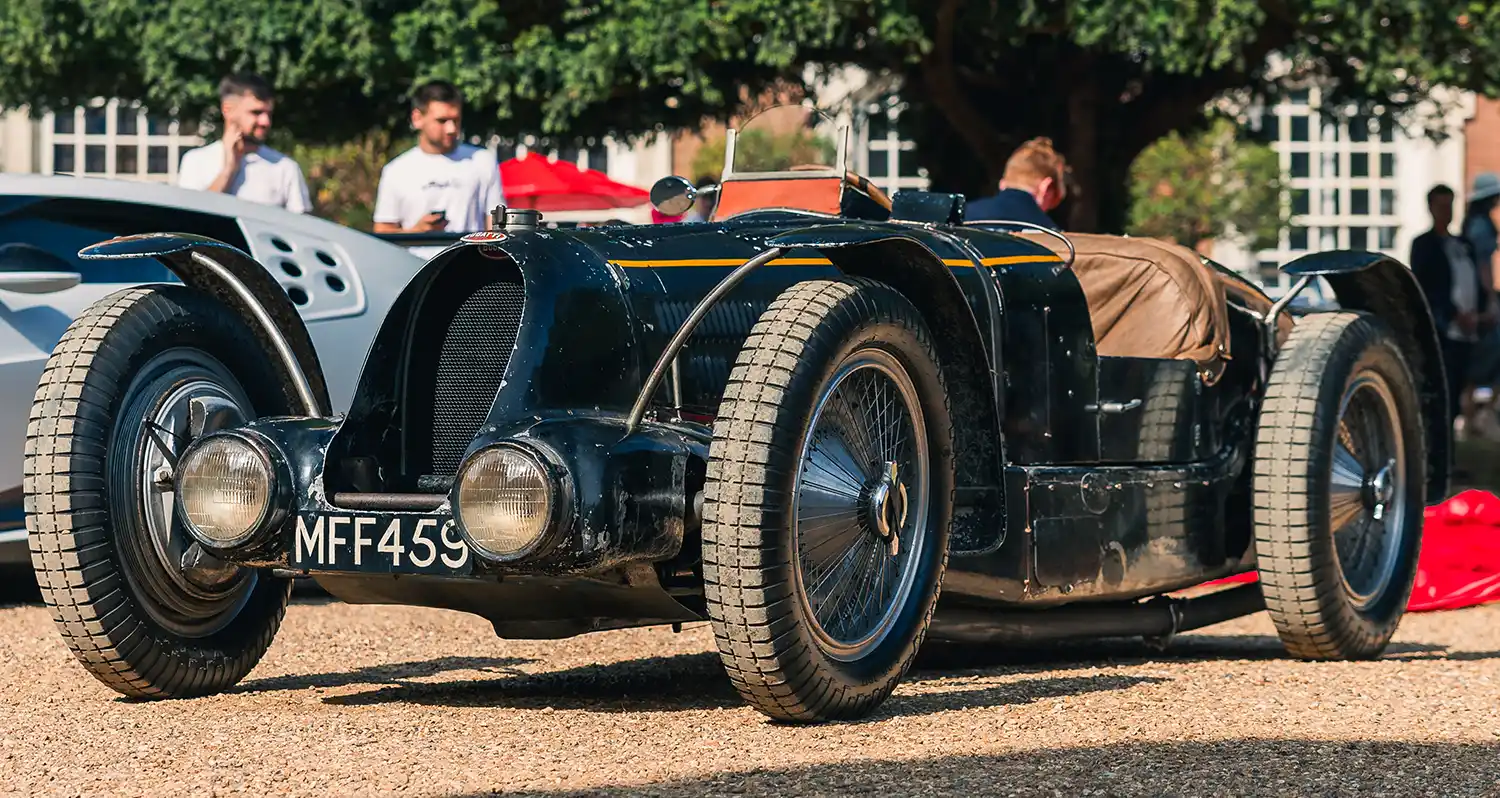
1930s: 1934 Bugatti Type 59
In the 1930s category, the wonderfully original Type 59 took victory. The 1934 Type 59 – part of Switzerland’s Pearl Collection – was developed in answer to increasing motor sport competition from the likes of Mercedes-Benz and Alfa Romeo. It was, and still is, considered to be both a technical marvel and a masterpiece of industrial art, with remarkable ‘piano-wire’ wheels, dropped body – and thus lower centre of gravity – longer wheelbase and supercharged straight-eight. As Bugatti’s final GP machine, the T59 is widely held to be the most elegant pre-war competition machine of all. Just six were built, and this particular example went on to take third at the Monaco Grand Prix and overall victory in Belgium.
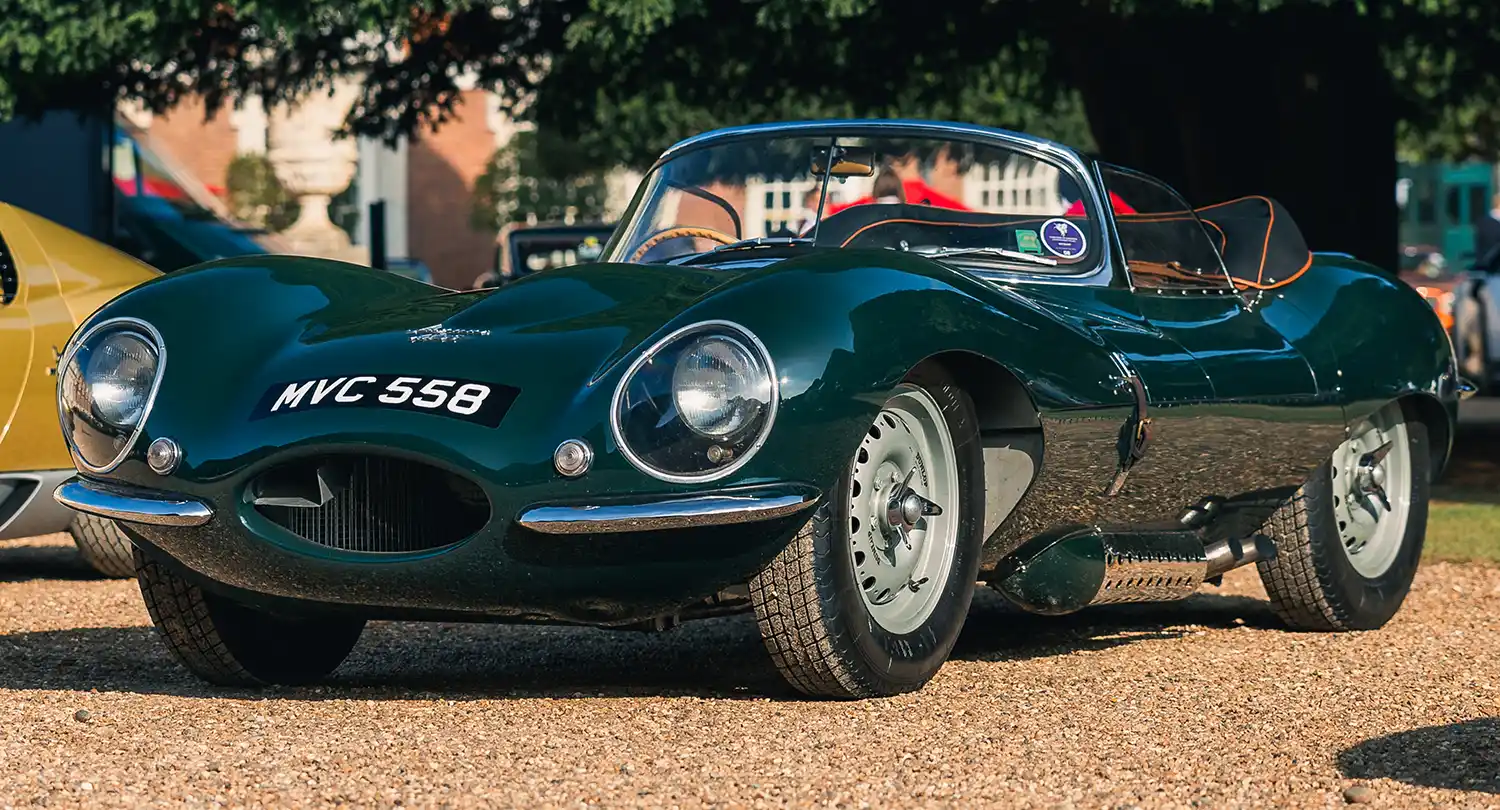
1950s: 1956 Jaguar XKSS
In the 1950s class, it was the stunning Jaguar XKSS that took the top prize. Jaguar’s abrupt withdrawal from motor sport activities meant that several competition D-types remained. At the time, the American market was hot for European sports cars. Sir William Lyons, seeing the potential for sales success across the pond, ordered a small run of road-going versions of the remaining D-types, to be called the XKSS. Chassis XKD 550 is the 16th and final of the D-Types to be converted to XKSS specification by the factory. The 250bhp 3.4-litre straight-six machine was dispatched to Jaguar Cars in New York in November 1957, and remained in the US until 2009. Now residing in the UK, remains in full factory conversion spec. A superb example of one of the rarest and most desirable British motor cars.
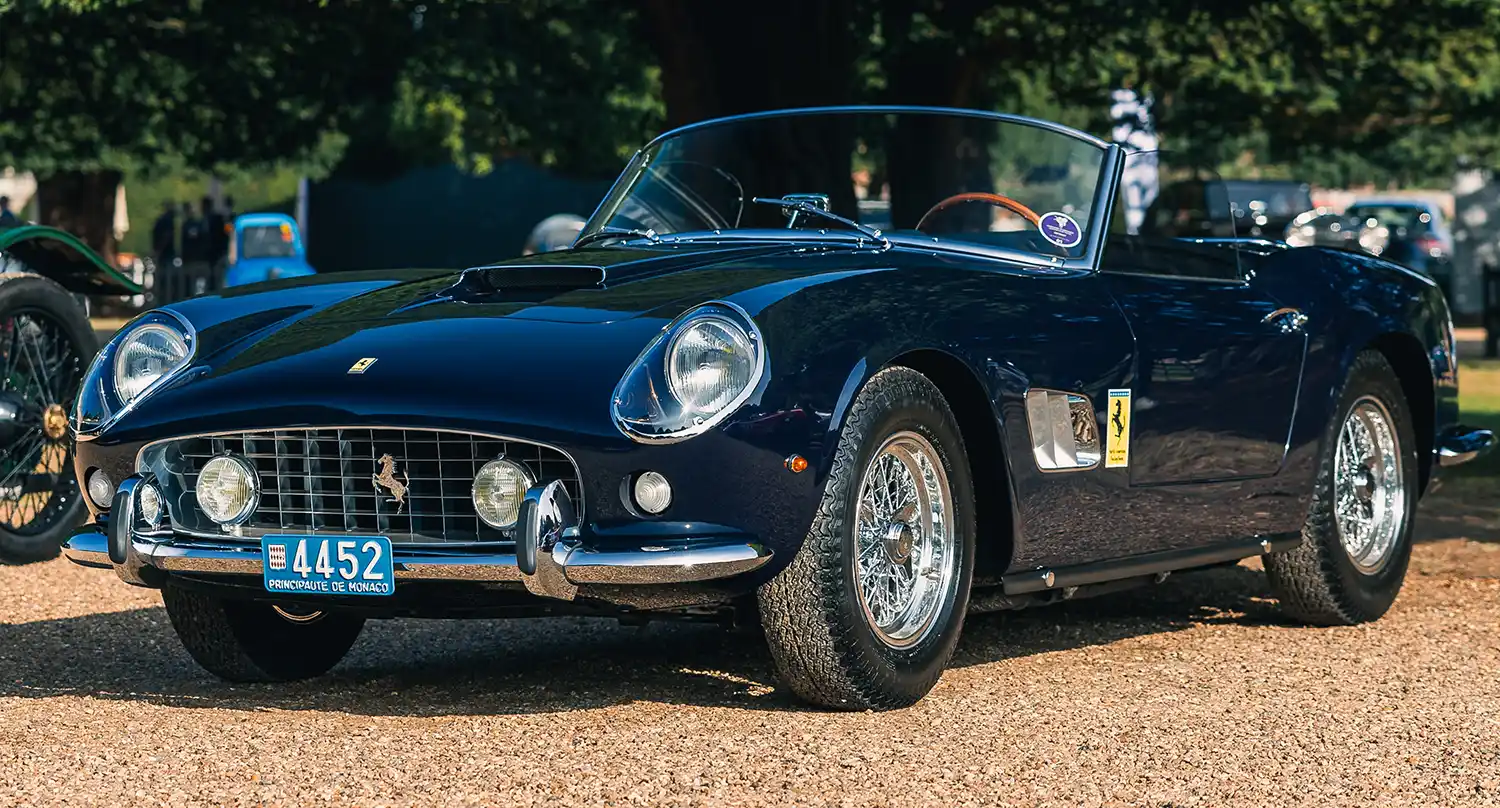
1960s: 1961 Ferrari 250 GT SWB California Spider
In the hotly contested 1960s category, it was the Ferrari 250 GT SWB California Spider which won favour with the other concours owners. As a former Paris Auto Salon star, followed by a period in the ownership of Alain Delon, one of France’s foremost actors, this particular 1961 250GT California Spyder is no stranger to the spotlight. The handsome and charming film star was frequently pictured in the Ferrari, no. 2935GT, often alongside stars such as Jane Fonda and Shirley MacLaine. In recent years it has been treated to a full restoration by specialist Paul Russell and Company, and is in truly stunning condition. Parked up in the Hampton Court Palace gardens, it’s rich ‘Max Meyer Bleu’ paint glinting in the sun, it really was hard to resist. Another worthy winner.
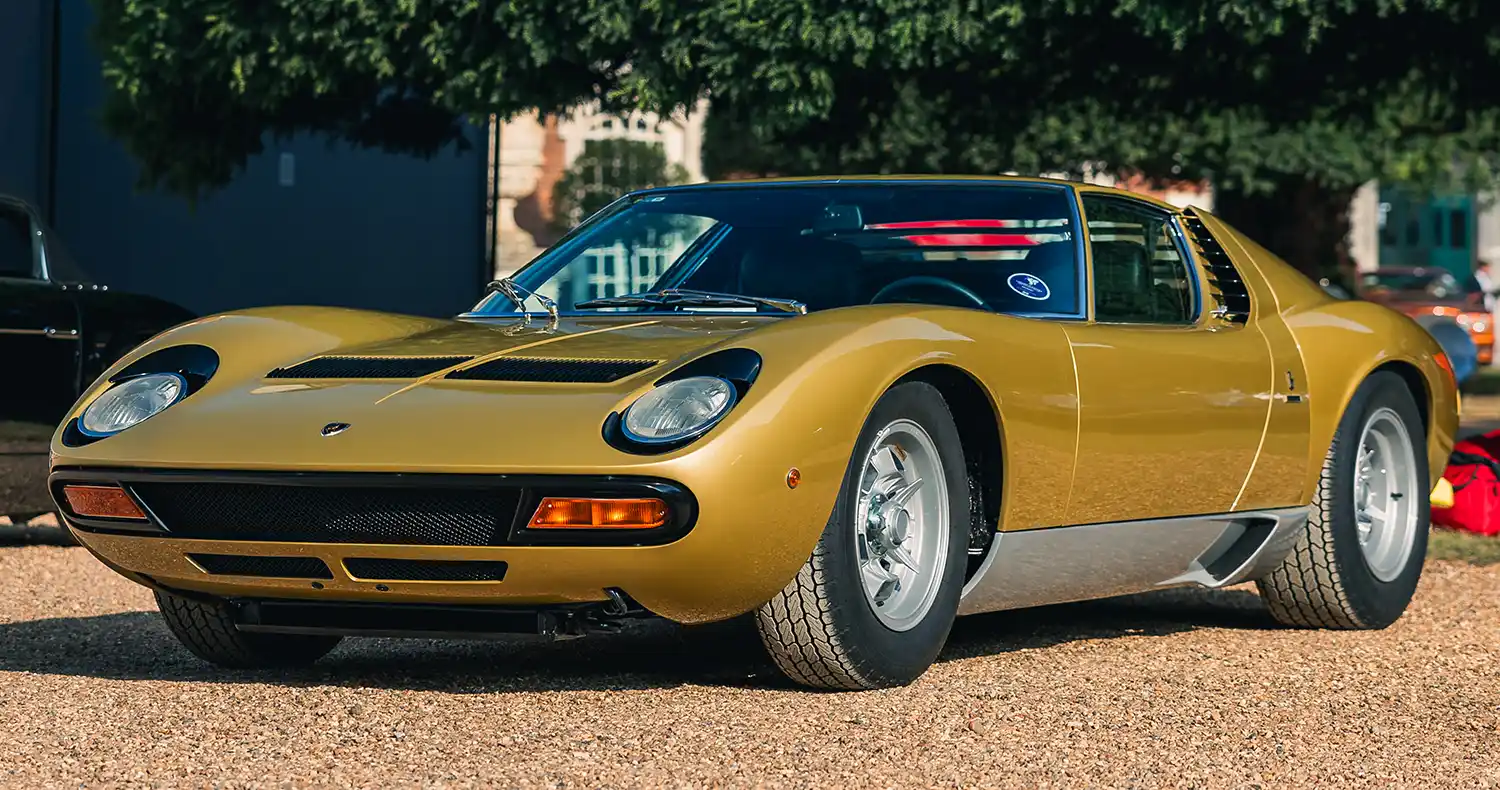
1970s: 1971 Lamborghini Miura P400 SV
In the 1970s class, it was perhaps the most iconic supercar of all, a 1971 Lamborghini Miura P400SV – resplendent in its ‘Oro Metallizzato’ gold paint – that won the hearts of voters. The ultimate version of the Miura – the SV – appeared in 1971, with altered Weber carburettors and different cam timing, which pushed output to 385bhp and torque to 295lb ft. Chassis 4878 was delivered new to French industrialist Jacques Dembiermont, and is one of just a handful of cars upgraded to SV spec by the factory in period. An ‘enthusiastic’ driver, Dembiermont enjoyed using his car ‘to the max’, often traversing Europe with his wife (and their dog) in the passenger seat. His son later recalled them completing the 140 mile drive from Paris to Avallon in just one hour. It’s appearance at Hampton Court was its first since the completion of a 3 year-long restoration.
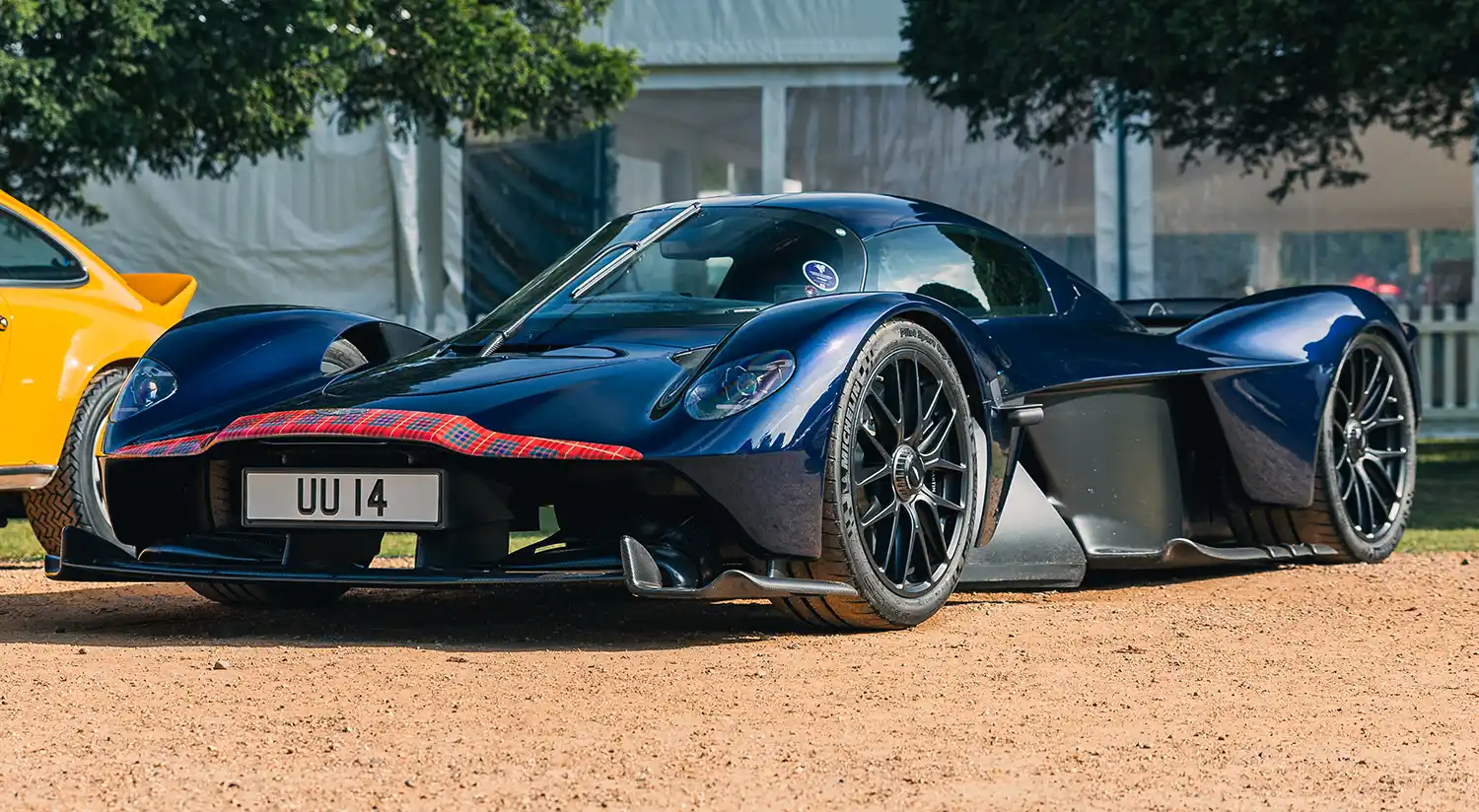
Future Classics: 2023 Aston Martin Valkyrie
There was another great contest in the ‘Future Classics’ category, with the ultra-high performance Valkyrie coming out on top. Marrying one of the world’s most treasured marques with what many consider to be the greatest Formula 1 designer of all time, the limited-production Valkyrie hybrid sports car is the dramatic result of a meeting of the finest minds in the automotive and motor sport industries. Aston Martin bought Red Bull’s Christian Horner and Adrian Newey on board to produce what would become one of the most ferocious road machines ever. The Valkyrie boasts a 6.5-litre Aston Martin-Cosworth V12 married to an electric motor to create a 1139bhp monster, which is also capable of generating up to 1814kg of downforce. The victorious car is one of just 150 Valkyries produced, and features a number of ‘Q’ special order touches.
Le Mans Awards
For 2023 the Concours was celebrating the Centenary of the Le Mans 24 Hours race, in partnership with L’Automobile Club D’Ouest, the race’s organisers. Fittingly, there were 24 cars with Le Mans history in attendance, with awards handed out for the most compelling.
In the 1920s and 1930s category, the 1929 Bentley Speed Six ‘Old Number One’ took victory again – a double winner once more! The 1950s and 1960s award went to the 1964 Ferrari 250 LM – a dazzling 850kg mid-engined V12 machine that was born to race. In the 1970s to Present Day category, the owners opted for the 1972 Ferrari 365 GTB/4 Daytona Group 4 Competition. Capable of hitting 186mph on the Mulsanne straight, it finished 5th overall and first in class in 1972. Its deafening 430bhp 4.4-litre V12 will still be ringing in the ears of those who witnessed it roar up to the Concours Stage yesterday afternoon.
Elsewhere at the event, the women-only Levitt Concours, celebrating female car enthusiasts and collectors, was a once again a great success. The trophy went to a stunning 1955 Frazer Nash Le Mans Coupé, another car with La Sarthe competition history. The ‘30 under 30’ award – celebrating younger enthusiasts – went to a 1981 Porsche 924.
Gooding & Company’s London auction, held alongside the main Concours in the Hampton Court Palace grounds on Friday, also generated significant interest. Lots from all eras were once again evocatively arranged in the Palace’s inner courtyards ahead of the highly successful sale.
James Brooks-Ward, Concours of Elegance CEO, said: “We’re delighted to report that Concours of Elegance 2023, the 12th edition of our show, was the most spectacular yet. Our curators pulled out all the stops, assembling an array of machinery the likes of which has never been seen in the UK before – all in the most incredible historic royal palace setting. With such a remarkable array of Le Mans winners alongside the other rare and significant machinery, 2023’s show is one that will certainly live long in the memory for our guests.
We’d like to take this opportunity to thank all our partners, and particularly presenting partner A. Lange & Söhne, as well as our immensely generous owners for their continued support. Without them this special event would simply not be possible.”
Full List of Winners
- Best in Show: 1955 Maserati A6GCS/53 Frua Spider
- Pre-1920: 1913 Hispano-Suiza 14/45HP ‘Alfonso XIII’
- 1920s: 1929 Bentley Speed Six ‘Old Number One’
- 1930s: 1934 Bugatti Type 59
- 1950s: 1956 Jaguar XKSS
- 1960s: 1961 Ferrari 250 GT SWB California Spider
- 1970s: 1971 Lamborghini Miura P400 SV
- Future Classics: 2023 Aston Martin Valkyrie
- Le Mans – 1920s and 1930s: 1929 Bentley Speed Six ‘Old Number One’
- Le Mans – 1950s and 1960s: 1964 Ferrari 250 LM
- Le Mans – 1970s to Present Day: 1972 Ferrari 365 GTB/4 Daytona Group 4 Competition
- Club Trophy: 1968 Aston Martin DBS
- Classic & Sports Car Trophy, Saturday: 1967 Aston Martin DB6 Volante
- Classic & Sports Car Trophy, Sunday: 1972 Marcos Mantis M70
- Junior Concours: Bugatti Type 13 Brescia
- Levitt Concours: 1955 Frazer Nash Le Mans Coupé
- 30 Under 30: 1981 Porsche 924
- Prince Michael of Kent Award: 1962 AC Shelby Cobra ‘CSX 2001’
- Chairman’s Award: 1937 Peugeot 302 DS Darl’Mat
The Concours of Elegance will return to Hampton Court Palace from the 30th August to 1st September 2024.
Away from the automotive displays, the Concours of Elegance 2023 was again an occasion of pure luxury, with Champagne provided by Charles Heidsieck, picnics by Fortnum & Mason, and a collection of art, jewellery and fashion displays. Presenting Partner A. Lange & Söhne was also on hand to showcase some of its most intricate timepieces.
